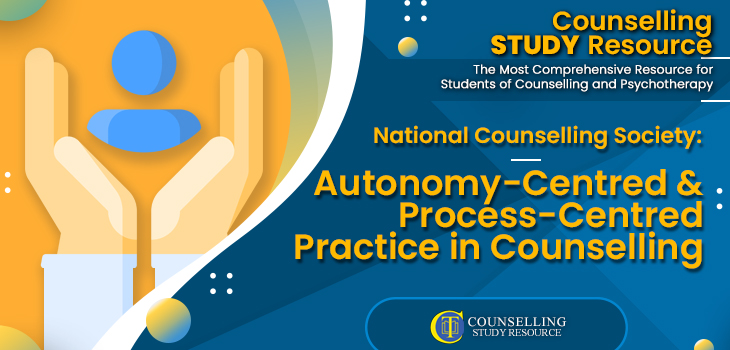Special Edition - National Counselling Society: Autonomy-Centred and Process-Centred Counselling Practice
We broadcast a special edition podcast on the National Counselling Society (NCS) in March 2019. This followed questions posed by members of the Counselling Tutor Facebook group. Rory then revisited the NCS in October 2020, with more questions gathered from the Facebook group, and spoke to NCS Chief Executive Meg Moss.
In this third podcast about the NCS's work, Rory and Meg discuss the debate around autonomy-centred and process-centred counselling practice.
Meg explains the differences between these two, explaining that a process-centred counselling practice is based on the medical model, while an autonomy-centred counselling practice is based on an organic/holistic model.
The two terms - 'process-centred' and 'autonomy-centred' - were used by the NCS in its response to the strategic review by the Professional Standards Authority (PSA) of the Accredited Registers Programme.
In the podcast, Meg describes the two terms as follows:
Autonomy-centred practice
- Takes a phenomenological approach
- Views each person as an individual
- Sees the therapeutic relationship as key
- Offers autonomy for both parties
- Supports creativity
- Is not measurable
- Provides flexibility
- Offers a space for wellbeing
- Centres on equality and diversity
- Considers the impact of society on wellbeing
- Is a vocation
Process-centred practice
- Focuses on symptoms
- Aims to 'diagnose' and 'cure'
- Looks to stop a specific thing from happening
- Draws up a treatment plan
- Involves box-ticking
- Takes a set approach to dealing with a particular problem, offering a standard solution
- Is more able to be measured
- Is a profession
Rory and Meg move on to discuss regulating counselling and psychotherapy. Meg explains what the PSA and Health & Care Professions Council (HCPC) are and do:
- The PSA helps to protect the public through its work with organisations that register and regulate people working in health and social care. It is independent and accountable to the UK Parliament. Through its Accredited Registers Programme (set up in 2012), the PSA assesses organisations that register health and social care practitioners (e.g. the NCS) who are not regulated by law so that members of the public can choose a practitioner to meet their needs with confidence.
- The HCPC protects the public by regulating 15 health and care professions. They set standards for professionals' education, training and practice; maintain a register of professionals who meet these standards; and take action if any registrants don't meet its standards. There were discussions in 2009 about the possibility of counsellors and psychotherapists becoming regulated by the HCPC, but this did not go ahead.
Meg believes that the voluntary regulation scheme offered through the Accredited Registers Programme works well. She explains that the NCS is not specifically against regulation - especially if it helps protect and reassure the public - but it does have concerns about some potential consequences of this, including:
- standardisation leading to homogenous practice
- difficulties in regulating a role that by nature has a wide range of ways of practising
- limitations to the scope of practice
- cumbersome nature of the regulation process
- people not wanting to train as counsellors, or qualified practitioners leaving due to regulation-related pressures and costs
- push towards a hierarchical structure for counselling and psychotherapy.
Meg describes the basis for the NCS's stance on regulation, which is - as with the rest of its work - based on the results of seeking members' views on this, as well as its investigation and analysis of relevant documentation and actions.


